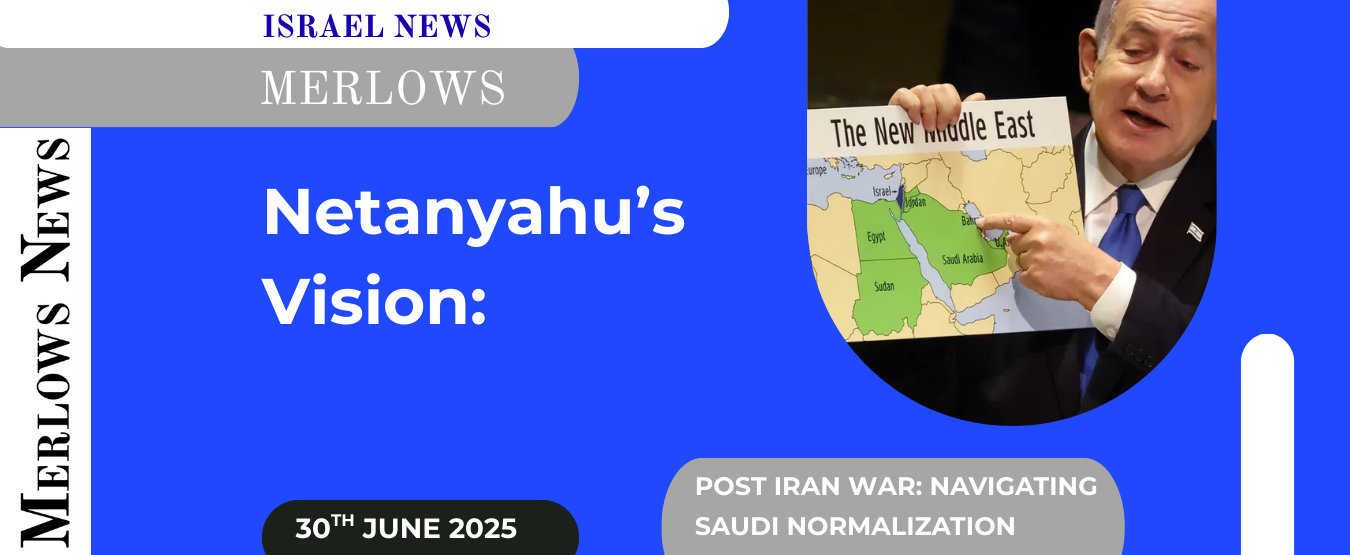When the guns fell silent on June 24, 2025, after twelve blistering days of warfare between Israel and Iran, Prime Minister Benjamin Netanyahu wasted no time in declaring that Israel’s hard-won military advantage must now be converted into diplomatic momentum. His call was not abstract. It was aimed squarely at one of the most sought-after prizes in Israeli foreign policy: full normalization with Saudi Arabia.
The June war was decisive in more ways than one. Israel’s precise, multi-domain strikes crippled Iranian nuclear infrastructure, disrupted the Islamic Republic’s missile and drone networks, and eliminated key military and intelligence commanders. Iran’s retaliation, though massive in scale, was largely blunted by Israel’s layered air-defense systems and the rapid deployment of American assets. In the aftermath, regional capitals took notice—not only of Israel’s military prowess, but also of Washington’s renewed willingness to act decisively in the Middle East.
Netanyahu’s argument is blunt: strength wins respect, and respect opens doors.
He believes that Saudi leaders, having watched Iran’s vulnerability exposed, now see greater advantage in building a formal partnership with Israel than in holding to the old formulas that have dominated Arab diplomacy since 1948. “We cannot waste even a single day,” Netanyahu told a press conference days after the ceasefire. “Opportunities like this are rare.”
A Strategic Recalibration in Riyadh
Saudi Arabia’s calculus is complex. Crown Prince Mohammed bin Salman’s Vision 2030 agenda is anchored in economic diversification, technological modernization, and a gradual reshaping of the Kingdom’s global image. In each of these areas, Israel is not a rival but a potential partner. Israeli water technology could help Saudi Arabia address chronic shortages; Israeli cybersecurity expertise could safeguard the Kingdom’s digital transformation; Israeli agricultural innovation could help feed its growing population.
Privately, some Saudi advisors acknowledge that normalization with Israel could unlock billions in trade and investment and bolster Riyadh’s regional leadership at a time when Iran’s influence has been dented. Yet, public opinion—and the Kingdom’s traditional role as custodian of Islamic holy sites—still binds Riyadh to the Palestinian cause. Officially, the Saudi position remains tied to the Arab Peace Initiative: full recognition of Israel in exchange for a Palestinian state along 1967 lines.
Netanyahu, however, is betting that Saudi leaders will be willing to redefine their terms if they believe normalization serves the Kingdom’s national interests. His confidence is bolstered by the precedent of the Abraham Accords, in which the UAE and Bahrain set aside Palestinian preconditions to pursue direct ties with Israel, citing shared security concerns and mutual economic benefits.
The American Factor
The United States looms large in this equation. Under President Donald Trump, Washington has made it clear that it will support regional normalization efforts but is also willing to recalibrate its approach. In May 2025, the administration signaled that Saudi recognition of Israel was no longer a precondition for advancing civil nuclear cooperation with Riyadh. That policy shift could lower the diplomatic cost for the Saudis to engage Israel on parallel economic and security tracks before formal recognition.
For Israel, American backing provides both leverage and a security umbrella. Joint U.S.-Israeli operations during the June war underscored that the alliance is more than symbolic; it is operational, immediate, and—when necessary—lethal. The Saudis took note.
Challenges and Risks
The road to Riyadh is far from clear. The unresolved conflict in Gaza remains a stumbling block. While some Gulf states have been willing to normalize without a Palestinian state, Saudi Arabia’s symbolic and religious stature makes it more cautious. Additionally, hardliners within Netanyahu’s own coalition oppose any concessions that could pave the way for Palestinian sovereignty, narrowing the Prime Minister’s room to maneuver.
Iran, too, is unlikely to sit idle. Even weakened, Tehran retains proxy networks and asymmetric tools to disrupt rapprochement between Israel and the Arab world. Cyberattacks, disinformation campaigns, and proxy escalation in Lebanon or Yemen could all serve to undermine the diplomatic thaw.
The Case for Peace Through Strength and Trade
Yet the strategic logic behind Netanyahu’s push is compelling. The June war demonstrated that Israel can defend itself decisively, deter its enemies, and emerge stronger. For Saudi Arabia, the message is equally clear: a secure Israel is a more reliable partner than a beleaguered one, and economic partnership with Israel offers tangible benefits far beyond symbolic diplomacy.
In Netanyahu’s view—and in the vision of MERLOWS.com—the path forward is not built on illusions of mutual affection, but on the hard realities of shared interest. Peace through strength, underpinned by trade and mutual prosperity, is a formula that has already reshaped the Gulf. If applied to the Kingdom, it could transform the political map of the Middle East for a generation.
The coming months will test whether Riyadh is ready to take that leap—and whether Jerusalem is prepared to meet them halfway.







Share this: